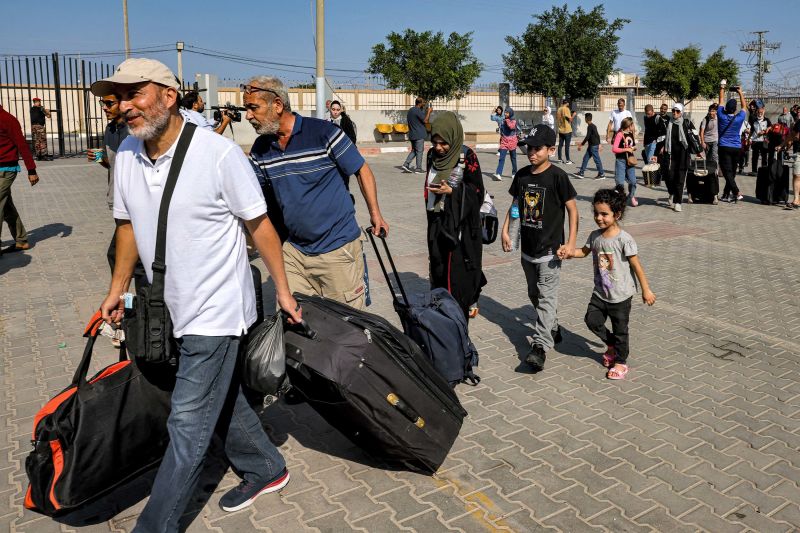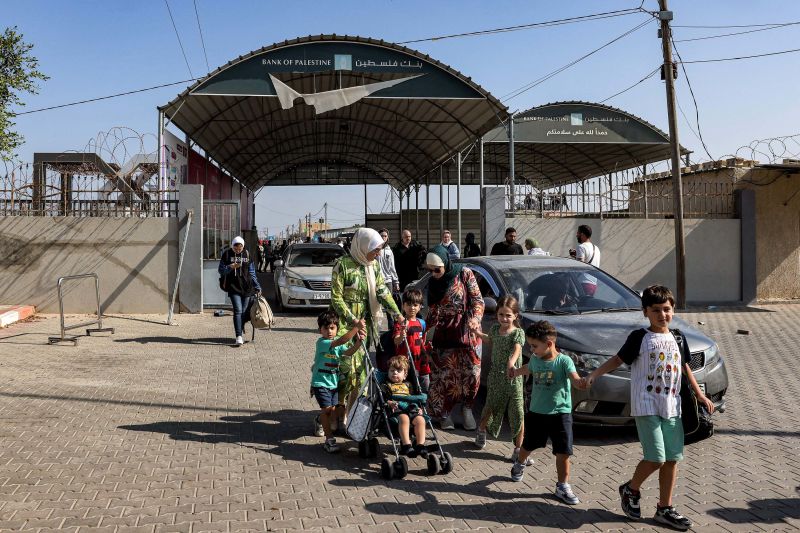
What is Rafah Crossing: A Lifeline for Gazans Seeking Refuge from War?

The Rafah crossing, located in the south of Gaza, is the last glimmer of hope for Gazans seeking refuge from the ongoing conflict as Israel's bombs devastate the region Discover the current situation at Rafah, its significance, evolving access policies, the process of crossing, and Egypt's hesitancy to open its borders for the people of Gaza
After extensive negotiations, a limited number of Palestinians and foreign nationals have managed to depart from Gaza. The recent opening of the Rafah crossing with Egypt has provided a glimmer of hope for those trapped in the besieged enclave, seeking refuge from the Israeli airstrikes.
On Wednesday, a number of individuals were able to leave Gaza through Rafah as a result of a deal facilitated by Qatar involving Israel, Hamas, and Egypt, with the coordination of the United States. This follows the recent increase in the entry of aid trucks into the enclave, which also required extensive negotiations.
Here's what you need to know about Rafah, the only border crossing in Gaza that operates independently from Israel. After the attack by Hamas on October 7, Israel closed its border crossings with the territory. Rafah has now become a crucial location due to the worsening humanitarian situation in Gaza.
What is the situation at Rafah now?
For the first few weeks of the Israel-Gaza war, the Rafah crossing remained shut - leaving Palestinians with no way out of the enclave.
Recently, a partial opening occurred to permit a small convoy of aid trucks to enter Gaza. Additionally, on Wednesday, there was another opening allowing a limited number of one hundred injured Palestinians and foreign nationals to leave - marking the first instance of non-hostages being released from Gaza since Hamas's attacks on Israel on October 7.
Upon arrival in Egypt, the injured Palestinians were promptly transported to hospitals, while waiting ambulances and consulate employees were stationed on the Egyptian side to facilitate the admission process into the country.
Officials on the Palestinian side reported on Wednesday that 110 foreign passport holders had left Gaza. It remains uncertain whether all of these individuals have successfully entered Egypt. Additionally, aid workers have expressed concern regarding the insufficiency of supplies reaching Gaza, which fall far short of meeting the needs of the 2.2 million people living under the blockades imposed by Israel and Egypt. Notably, no fuel trucks have accessed the crossing for several weeks, with Israel citing the fear that Hamas may utilize the fuel for its own military operations.
The situation in Gaza has been deemed as "catastrophic" by the World Food Programme (WFP) due to the scarcity of food, water, electricity, and fuel. Consequently, the WFP has appealed for additional aid to be granted access to the territory.
Why is the crossing so important right now?
Located in the northern Sinai of Egypt, the Rafah crossing stands as the only border crossing connecting Gaza and Egypt. Situated along an 8-mile (12.8-kilometer) fence, it acts as a physical barrier separating Gaza from the Sinai desert.
Throughout the past 70 years, Gaza has experienced multiple changes in governance. Following the 1948 Arab-Israeli war, it came under the control of Egypt, but was later captured by Israel in the 1967 war. Subsequently, Israel began establishing Jewish settlements in the area and implemented strict limitations on the movement of its Palestinian inhabitants. In 2005, Israel withdrew its troops and settlers from Gaza, allowing for the territory to come under the control of Hamas two years later.
Egypt and Israel have implemented stringent border controls and restrictions on travel by sea or air to the territory. Additionally, Israel has fortified the area with a heavily fortified border fence.
People enter the Rafah border crossing in the southern Gaza Strip on November 1, 2023.
Mohammed Abed/AFP/Getty Images
Foreign nationals and injured Palestinians are now permitted to leave Gaza for the first time since the Israel-Hamas conflict commenced. Prior to the outbreak of the war in early October, Israel had two crossings with Gaza: Erez, designated for the movement of individuals, and Kerem Shalom, solely for the transport of goods. However, due to the intensified restrictions imposed, both crossings have remained closed since the commencement of the conflict.
The Rafah crossing is currently the only point of entry for the territory to access the outside world, as per United Nations data. In July of this year, an average of 27,000 individuals crossed the border per month. The border operated for a total of 138 days, while remaining closed for 74 days during the same period.
Closures frequently rely on the security and political conditions in the region. Although Israel lacks direct authority over the crossing, Egypt's closures frequently align with Israel's own imposition of stricter measures on Gaza.
How has Rafah crossing access changed over time?
In 1982, Israel and Egypt entered into a peace treaty, resulting in the Jewish state's withdrawal from the Sinai Peninsula that it had previously seized from Egypt in 1967.
Subsequently, Israel relinquished control of the Rafah crossing after its withdrawal from Gaza in 2005. From that point until the Hamas takeover in 2007, the European Union took charge of managing the crossing in cooperation with Egyptian authorities.
Between 2005 and 2007, approximately 450,000 passengers utilized the crossing, averaging around 1,500 individuals per day.
After Hamas gained control, Egypt and Israel imposed much stricter limitations on the transportation of goods and individuals into and out of the region. However, in 2008, extremists destroyed the fortifications along the Egypt-Rafah border, causing at least 50,000 Gazans to flock into Egypt in order to purchase essential commodities such as food, fuel, and other supplies.
Shortly after the breach, Egypt swiftly sealed its barrier by erecting barbed wire and metal barricades.
Ever since then, the Rafah crossing has been subjected to stringent control measures, imposing restricted access and subjecting Palestinians to extended bureaucratic and security protocols if they aspire to enter Egypt.
People enter the Rafah border crossing on Wednesday.
Mohammed Abed/AFP/Getty Images
What is it usually like to cross the Rafah border?
Movement through Rafah is heavily restricted, allowing only individuals with permits and foreign nationals to travel between Gaza and Egypt. Gazans who desire to cross the border frequently encounter extensive delays. According to Jason Shawa, a Palestinian American residing in Gaza, the procedure has typically consumed at least 30 days, with wait times occasionally stretching to three months.
Travelers are required to obtain an exit permit from Hamas and an entry permit from Egypt, according to the source. To initiate the process, the traveler must submit their documents to a Hamas government office for an exit permit. Subsequently, the traveler would receive a text message indicating the approved departure day, which could be as far as three months in the future.
On the day of departure, travelers would be transported by bus from the Palestinian side of the border to the Egyptian side. At this point, they would endure several hours of waiting for Egyptian authorities to receive and process their visa applications. The source highlights that many travelers are denied entry at this stage, and Palestinians often face mistreatment in these circumstances.
Why is Egypt reluctant to open the crossing for Gazans?
The potential influx of hundreds of thousands of Palestinian refugees into Egypt, a country already accommodating millions of migrants, has raised concerns. Gaza, home to over 2 million Palestinians, further amplifies the unease in Egypt.
Egypt's President, Abdel Fattah el-Sisi, recently expressed his country's intentions to provide assistance, albeit with certain limitations. He emphasized the importance of maintaining a cautious approach and utilizing rational thinking to achieve peace and security without incurring excessive costs.
The notion of forcibly displacing the population of Gaza and turning them into refugees has ignited anger among many. A significant number of Gazans are officially recognized by the UN as refugees, tracing their ancestral roots to areas that now belong to Israel.
"This seems like a deliberate attempt by certain individuals to create practical problems on the ground. We cannot accept turning Jordan or Egypt into new havens for refugees," stated King Abdullah of Jordan.
Egypt has urged Israel to permit the entry of humanitarian assistance through Rafah, however, it has not acquiesced to the United States' request for the creation of a secure passageway for civilians within Egyptian territory. The article has been revised to incorporate further updates.















